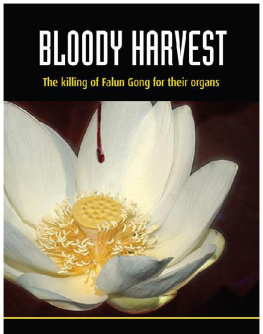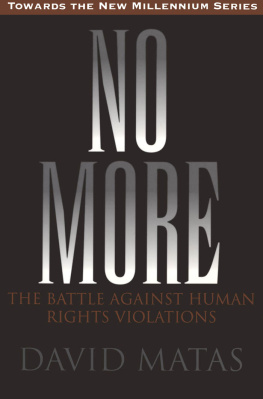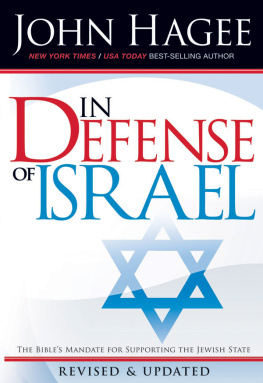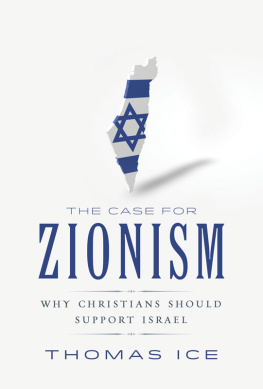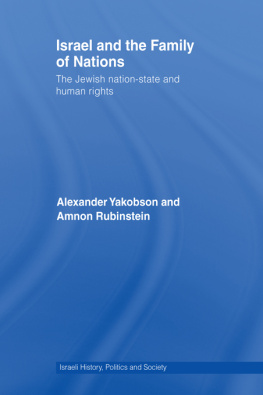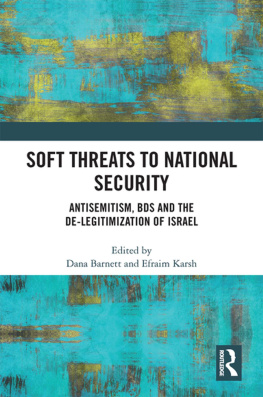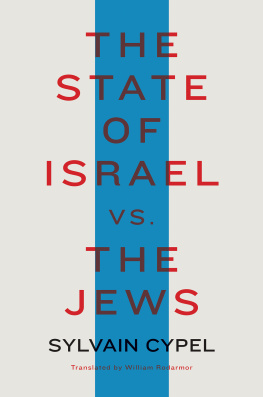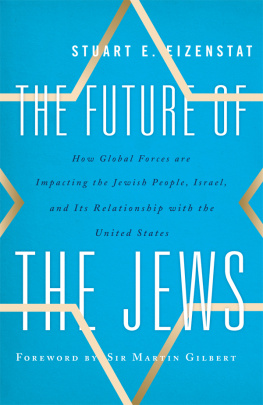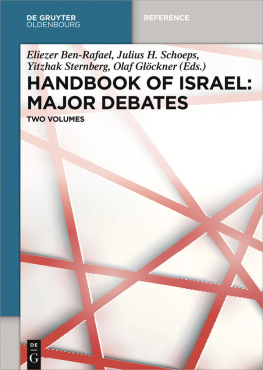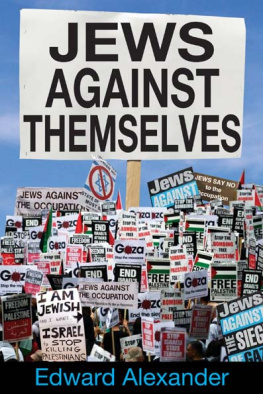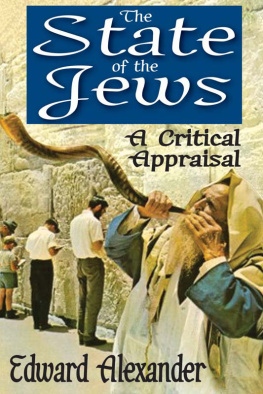Aftershock
AFTERSHOCK
ANTI-ZIONISM AND ANTISEMITISM
BY D AVID M ATAS
Copyright David Matas, 2005
All rights reserved. No part of this publication may be reproduced, stored in a retrieval system, or transmitted in any form or by any means, electronic, mechanical, photocopying, recording, or otherwise (except for brief passages for purposes of review) without the prior permission of Dundurn Press. Permission to photocopy should be requested from Access Copyright.
Copy-Editor: Andrea Pruss
Design: Andrew Roberts
Printer: Webcom
Library and Archives Canada Cataloguing in Publication
Matas, David
Aftershock : Anti-Zionism and Antisemitism / David Matas.
Includes bibliographical references and index.
ISBN-10: 1-55002-553-8
ISBN-13: 978-1-55002-553-8
1. Antisemitism. 2. Zionism. I. Title.
DS145.M38 2005305.8924C2005-901766-X
123450908070605
We acknowledge the support of the Canada Council for the Arts and the Ontario Arts Council for our publishing program. We also acknowledge the financial support of the Government of Canada through the Book Publishing Industry Development Program and The Association for the Export of Canadian Books, and the Government of Ontario through the Ontario Book Publishers Tax Credit program, and the Ontario Media Development Corporation.
Care has been taken to trace the ownership of copyright material used in this book. The author and the publisher welcome any information enabling them to rectify any references or credit in subsequent editions.
J. Kirk Howard, President
Printed and bound in Canada.
Printed on recycled paper.
www.dundurn.com
Dundurn Press
8 Market Street, Suite 200
Toronto, Ontario, Canada
M5E 1M6
Gazelle Book Services Limited
White Cross Mills
Hightown, Lancaster, England
LA1 4X5
Dundurn Press
2250 Military Road
Tonawanda NY
U.S.A. 14150
Naively, I was convinced that antisemitism died in Auschwitz.
Elie Wiesel, New York, June 21, 2004, United Nations.
TABLE OF CONTENTS
ACKNOWLEDGMENTS
T HOUGH there are many individuals I want to thank, I first of all have to acknowledge Bnai Brith Canada as an organization. From the time I first became active in their advocacy work in 1979, the organization has provided unstinting institutional support. I participated in many of the events that led to the conclusions this book sets out as a Bnai Brith Canada representative.
Because so many for so long within Bnai Brith have offered their support, it is invidious to name just some of them. I will inevitably omit the names of others who should be mentioned. I nonetheless cannot help but name Rochelle and Sid Wilner, Frank Dimant, Stephen Scheinberg, Marvin Kurz, Ruth Klein, Anita Bromberg, Karen Mock, Karen Lazar, Amos Sochaczevski, Toni Silberman, Amy Goldstein, Dan Mariaschin, Klaus Netter, Harold Davis, Ted Greenfield, Hershie and Marilyn Frankel, Brian and Harriet Morris, Aurel Braun, Jules Kronis, Lou Ronson, Conrad Winn, Lyle Smordin, Moishe Smith, Rubin Friedman, Gordon Wiseman, Joseph Ben-Ami, Alan Yusim, and Leigh Halprin.
As well, I acknowledge the unfailing efforts of Stan Urman, executive director of the Center for Peace in the Middle East, East Orange, New Jersey, to promote justice for Jews from Arab countries. The chapter in this book on that subject was drawn from a report I co-authored with him.
Rebecca Holtzman, Arthur Gillman, and Floralove Katz provided me with a steady stream of insights, communications, and support. Irwin Cotler, now Attorney General and Minister of Justice for Canada, and Anne Bayefsky of the Hudson Institute in New York have contributed both wisdom and eloquence on the subject matter of this book. I have learned from listening to them and reading them.
Trevor Anderson guided me through the law of restrictive covenants. David Weisstub helped me with Jewish Holocaust theology.
Felice Gaer and Sybil Kessler of the Jacob Blaustein Institute have spurred and organized international initiatives to attempt to grapple with anti-Zionistbased antisemitism. The chapter on the differences between Jewish and general human rights organizations in combatting antisemitism draws from a paper I wrote for a Jacob Blaustein Institute workshop in Vienna in 2003.
Finally, I have to thank Dundurn Press, my publishers. This is the second book they have published of mine. (They published No More: The Battle against Human Rights Violations in 1994.) I am, of course, grateful to any publisher that would venture to publish even one of my books. But for a publisher who has already published one book of mine to publish a second bespeaks a confidence in me that I cherish.
INTRODUCTION
Y OUSEF S ANDOUGA firebombed the Edmonton Beth Shalom Synagogue in the early morning of November 1, 2000. He brought to the synagogue two Molotov cocktails, each bottle filled with gasoline into which he had inserted a wick. He set one alight and threw it at a window. The firebomb broke the window but did not enter the building. It started a fire on the outside wall. Sandouga set himself on fire attempting light the second Molotov cocktail. He rolled on the ground to extinguish the flames on his clothing and fled. While rolling on the ground, he dropped his cellphone.
The synagogues caretaker, who lived in a residence next door, saw Sandouga flee. She found the cellphone. Her son and the firefighters they called put out the fire. The damage was limited to scorched bricks, burned vegetation, and two broken windows. The firefighters found gasoline spread along the wall of the synagogue where the Molotov cocktail had been thrown. A conflagration had been narrowly averted.
Through the cellphone, the police were able to track down Sandouga. He had been treated for burns at the Royal Alex Hospital shortly after the attack.
Sandouga was prosecuted for arson and pleaded guilty. In an agreed statement of facts, he stated that he attacked the synagogue out of frustration with events in the Middle East. The trial judge sentenced Sandouga to one year in jail. The Court of Appeal, on a prosecution appeal of sentence, increased the punishment to two and a half years in prison.
A fire accelerant was thrown through the window of the United Talmud Torahs elementary school library in Montreal in the early morning of April 5, 2004. The ten-thousand-volume library was destroyed. Books were burned, charred, covered in soot, melted, or damaged from the water used to extinguish the fire. Only twenty-five books, sitting separately in a box, survived. All six of the library windows were broken. Snow that morning fell through the windows onto the piles of blackened books. The library served 230 students. Estimated damage was $300,000.
A note, two pages long, was left duct-taped to the door of the school. The director-general of the school, Sidney Benudiz, got to the school before the police did, saw the note, and transcribed it before the police took it away. What Benudiz wrote down, in translation from its original French, was this:


